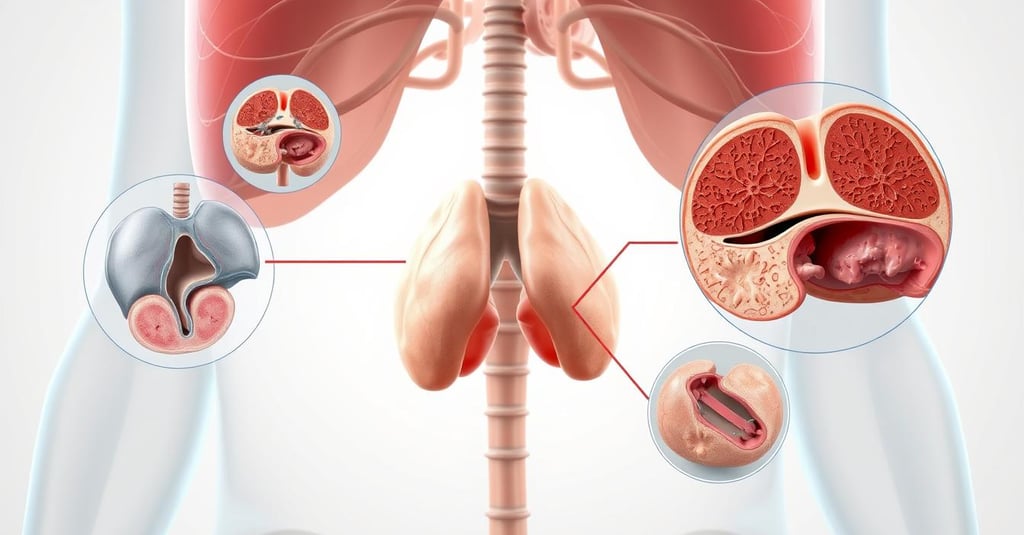Discover What Cortisol Is and How It Impacts Your Health
Curious about cortisol? Discover what this hormone is and how it can influence your physical and mental health.
STRESS MANAGEMENT
ActiveVitaLife
2/24/202510 min read
Introduction to Cortisol
Cortisol is called the "stress hormone" because it rises with stress. But it's more than that. It's vital for your body's functions, affecting sleep and weight. Knowing about cortisol helps you manage it and boost your health.
Key Takeaways
Cortisol is a hormone that plays a critical role in your body's stress response.
Understanding cortisol levels is key to managing stress and staying healthy.
Cortisol impacts sleep and weight management, among other things.
Controlling cortisol levels can enhance your health and well-being.
Cortisol is commonly known as the "stress hormone."
What is Cortisol?
Cortisol is a steroid hormone that helps the body deal with stress. It comes from the adrenal gland. It controls things like metabolism, immune response, and blood pressure. The cortisol function is complex and affects many areas of the body.
Cortisol does more than just handle stress. It also keeps the body healthy and balanced. It helps control blood sugar, breaks down fat, protein, and carbs, and boosts the immune system.
Regulation of blood pressure
Metabolism of nutrients
Support of immune function
Response to stress
Cortisol is key to keeping the body in balance. Knowing how cortisol function works helps us stay healthy. It helps prevent problems linked to cortisol.
The Function of Cortisol in the Stress Response
Cortisol is key in how our body handles stress. Its production starts with certain hormones being released. When we feel stressed, our body sends out corticotropin-releasing hormone (CRH). This hormone tells the pituitary gland to release adrenocorticotropic hormone (ACTH). Then, the adrenal glands make cortisol.
This whole process is important for our health. It helps us deal with stress better.
Cortisol does many things in our body. It changes blood sugar levels, blood pressure, and how our immune system works. It helps raise blood sugar by releasing glucose from stored energy. It also slows down the immune system to prevent inflammation and damage. But, too much cortisol can cause problems like weight gain, sleep issues, and mood swings.
Several things can affect how much cortisol we make and how it's regulated:
Stress levels: High stress can make cortisol levels go up.
Sleep: Not getting good sleep can mess with cortisol regulation.
Diet: Eating foods full of omega-3s, vitamins, and minerals can help with cortisol balance.
Knowing how cortisol works in stress is key to staying healthy. By understanding what affects cortisol, we can help our body handle stress better. This leads to healthier cortisol levels.
Cortisol and Sleep: What’s the Connection?
Cortisol levels affect our sleep patterns. High cortisol levels can mess up our sleep-wake cycle, causing poor sleep. Cortisol helps our body deal with stress, making us feel alert and awake.
Studies link cortisol imbalance to sleep disorders like insomnia. Cortisol can lower melatonin levels, which control our sleep-wake cycle. This makes it hard to fall or stay asleep.
Cortisol can disrupt sleep in many ways. It can raise our body temperature, making it hard to sleep. It also increases heart rate and blood pressure, making it tough to relax before bed. To better sleep, we need a regular sleep schedule, relaxation techniques, and avoid stimulating activities at night.
Impact on Sleep Quality
Cortisol levels can disrupt our natural sleep-wake cycle
Cortisol imbalance can lead to sleep disorders, such as insomnia
Cortisol can suppress the production of melatonin, the hormone that regulates our sleep-wake cycle
Cortisol Levels Throughout the Night
Cortisol levels naturally peak in the morning and drop at night. But, in those with imbalance, cortisol stays high, ruining sleep. Managing cortisol and sticking to a sleep schedule can improve our sleep and health.
Recognizing High Cortisol Levels
Cortisol is a hormone that helps our body deal with stress. But, too much cortisol can harm us. It's important to know the signs of high cortisol to lower its levels and protect our health.
Many things can cause high cortisol, like stress, bad diet, and not exercising enough. Knowing what causes high cortisol helps us manage it better and avoid its bad effects.
Signs of too much cortisol include gaining weight, mood swings, and skin issues. To spot high cortisol, we need to watch for these signs. We can lower cortisol by eating well, exercising, and managing stress.
Weight gain, mainly in the belly
Mood swings, like feeling anxious or irritable
Skin problems, like acne or thinning skin
By noticing the signs of high cortisol and managing it, we can lessen its harm. This helps us stay healthy and feel better overall.
The Effects of Low Cortisol Levels
Low cortisol levels can really affect the body. The cortisol hormone is key for keeping everything balanced. When it's low, you might feel tired, lose weight, and even change moods.
Symptoms of Low Cortisol
Some common signs of low cortisol include:
Fatigue and weakness
Weight loss and decreased appetite
Mood changes, such as depression and anxiety
Low blood pressure and dizziness
These symptoms can be different for everyone. They might look like other health issues. So, it's important to see a doctor to figure out what's going on.
Conditions Associated with Low Levels
Some health problems can cause low cortisol levels. These include Addison's disease and hypopituitarism. These issues can mess with cortisol production, causing symptoms and health problems. Getting the right treatment is key to managing these conditions and keeping cortisol levels right.
Cortisol and Weight Management
Cortisol levels are key in weight management. High cortisol can make you hungrier and change how you metabolize food. This makes it hard to keep a healthy weight. Also, it can cause more fat to be stored around your waist.
Knowing how cortisol affects weight gain is important for managing weight. Cortisol levels can stop you from losing weight, even if you eat well and exercise. To control cortisol, try stress-reducing activities like meditation and yoga. Also, eat foods that help keep cortisol in check.
Practicing stress-reducing techniques, such as deep breathing exercises
Getting enough sleep to help regulate cortisol levels
Eating a balanced diet that includes foods that help reduce cortisol levels, such as leafy greens and whole grains
Managing cortisol and living a healthy lifestyle can lower the risk of cortisol imbalance. This helps you maintain a healthy weight. Remember, cortisol levels change throughout the day. Being aware of these changes helps you make better choices about what you eat and how you exercise.
Lifestyle Factors Affecting Cortisol
Our daily habits and lifestyle choices greatly affect cortisol levels. Eating well, exercising regularly, and managing stress are key. These actions help keep cortisol balanced. By making smart choices, we can avoid cortisol-related problems and stay healthy.
Eating foods rich in omega-3 fatty acids, vitamin C, and whole grains helps control cortisol. Drinking lots of water is also vital for healthy cortisol levels. But, eating too much processed food and sugar can upset cortisol balance.
Regular exercise is important for keeping cortisol in check. Activities like yoga and brisk walking can lower stress and cortisol. It's important to balance exercise with rest to avoid too much cortisol.
Adding stress-reducing activities like meditation and deep breathing to our day can help manage cortisol. This promotes better health overall.
Engage in regular physical activity, such as yoga or brisk walking
Practice stress-reducing techniques, like meditation and deep breathing
Get enough sleep each night to help regulate cortisol levels
By living a healthy lifestyle and paying attention to our habits, we can manage cortisol levels. This reduces the risk of related disorders and boosts our overall health.
Cortisol's Role in Immune Function
The cortisol hormone is key in how our body fights off infections. When cortisol levels go up, it changes how our immune system works. It stops non-essential functions to focus on survival.
Studies show that too much stress can weaken our immune system. This is because cortisol slows down immune cells. This makes it harder for our body to fight off germs.
Suppressing the production of antibodies, which are essential for fighting off infections
Reducing the activity of immune cells, such as neutrophils and macrophages
Increasing the production of anti-inflammatory cytokines, which can suppress the immune response
It's important to understand how cortisol affects our immune system. By keeping cortisol levels in check and managing stress, we can boost our immune system. This helps us stay healthy and fight off illnesses better.
Natural Ways to Lower Cortisol Levels
High cortisol levels can harm your health. Luckily, there are natural ways to lower them. Simple changes in daily life can help reduce cortisol and improve well-being.
Eating right is key to lowering cortisol. A balanced diet with fruits, veggies, and whole grains helps. Also
Dietary Changes and Mindfulness
Eat a balanced diet that includes plenty of fruits, vegetables, and whole grains
Stay hydrated by drinking plenty of water
Practice mindfulness and relaxation techniques, such as meditation or deep breathing
Exercise is another great way to lower cortisol. It reduces stress and anxiety, which can raise cortisol. Adding physical activity to your day can help balance cortisol levels. These simple steps can lead to a healthier lifestyle, reducing cortisol imbalance and regulating levels.
Cortisol Testing: What You Need to Know
Knowing your cortisol levels is key to spotting and treating cortisol issues. Cortisol testing measures the hormone in your body. It helps find out if your cortisol is off balance, which affects your health.
There are different ways to test cortisol, like blood and saliva tests. Blood tests are more detailed but are invasive. Saliva tests are easy to do at home but might not be as precise.
Types of Cortisol Tests
Blood tests: measure cortisol levels in the blood
Saliva tests: measure cortisol levels in saliva
Urine tests: measure cortisol levels in urine
It's important to know what cortisol levels mean. Normal levels are between 5-23 micrograms per deciliter (mcg/dL). If your levels are too high or low, it could mean your cortisol is out of balance. Doctors use these tests to find and treat problems like Cushing's syndrome and Addison's disease.
Learning about cortisol testing and its results helps you take care of your health. You can make changes in your life to keep your cortisol in check. This might include managing stress, exercising, and changing your diet.
The Importance of Monitoring Cortisol Levels
Keeping an eye on cortisol levels is key for staying healthy. Cortisol helps keep our body's functions in balance. It's important to watch cortisol levels to manage stress, sleep better, and stay at a healthy weight.
Cortisol levels change during the day. Unregulated cortisol levels can harm our health over time. Risks include gaining weight, trouble sleeping, and a weaker immune system. Knowing the signs of cortisol imbalance is important to take action.
Try stress-reducing activities like meditation or yoga
Stay active with exercises like walking or jogging
Eat a diet full of omega-3 fatty acids and antioxidants
Following these tips can help avoid cortisol-related health issues. It keeps your overall health in top shape.
If you notice signs of cortisol imbalance, see a doctor. They can help with testing and create a plan to balance cortisol levels. This can help reduce any negative effects of cortisol.
Conclusion: Balancing Cortisol for Better Health
Keeping cortisol hormone levels healthy is key for our well-being. Cortisol helps us deal with stress, sleep better, and fight off infections. Knowing how to balance cortisol is important for our health and avoiding problems.
This article showed how cortisol affects our lives. We learned about signs of too much or too little cortisol. We also found natural ways to keep cortisol in check, fitting to each person's needs.
Cortisol is not just good or bad; it's essential for our body's response to stress. The goal is to keep cortisol levels just right. This helps us stay healthy in body, mind, and spirit. By reducing stress, eating well, and exercising, we support our cortisol balance.
Learning about and managing cortisol hormone levels is a big step towards better health. By being informed and taking a holistic approach, we can harness cortisol's power. This leads to a more vibrant and resilient life.
FAQ
What is cortisol?
Cortisol is a hormone made by the adrenal glands. It's key for the body's stress response. It helps control blood sugar, inflammation, and stress management.
What are the functions of cortisol in the body?
Cortisol has many important roles. It regulates blood sugar, controls inflammation, and manages stress. It also affects sleep, immune function, and memory.
How does cortisol affect the stress response?
Cortisol is vital in the stress response. When stressed, the body releases cortisol. It raises blood sugar, blood pressure, and heart rate. It also weakens the immune system and digestion.
How does cortisol impact sleep quality?
Cortisol levels change throughout the day. They're highest in the morning and lowest at night. Imbalanced levels can disrupt sleep, causing insomnia and fatigue.
What are the symptoms of high cortisol levels?
High cortisol can cause weight gain, fatigue, and anxiety. It can also lead to sleep issues, high blood pressure, and sugar cravings. A weakened immune system is another symptom.
How can low cortisol levels affect the body?
Low cortisol can cause fatigue, loss of appetite, and dizziness. It can also lead to mood changes and a weakened immune system. Digestive issues and low blood pressure are other symptoms.
How does cortisol influence weight management?
Cortisol affects weight management. High levels can increase appetite and slow metabolism, leading to weight gain. Healthy cortisol levels through diet and exercise support weight management.
What lifestyle factors can affect cortisol levels?
Lifestyle choices impact cortisol levels. Diet, exercise, stress management, and sleep quality are key factors. These choices can help regulate cortisol levels.
How does cortisol affect the immune system?
Cortisol is important for the immune system. It helps the body respond to threats by suppressing the immune system. Chronic high levels can weaken the immune system, making the body more prone to illness.
What are some natural ways to lower cortisol levels?
Natural ways to lower cortisol include a balanced diet and regular exercise. Stress-reducing activities like deep breathing and mindfulness are also helpful. Adequate sleep and limiting caffeine and alcohol are important too.
How can cortisol levels be tested?
Cortisol levels can be tested through blood, saliva, or urine samples. Blood tests measure cortisol at a specific time. Saliva and urine tests show levels throughout the day. These tests help identify imbalances and guide treatment.
When should someone seek medical advice about cortisol levels?
Seek medical advice for symptoms like unexplained weight changes, sleep issues, or mood swings. A healthcare provider can order tests and provide guidance on managing cortisol levels for overall health.
Read the Article: Cortisol Meaning: Exploring the Role of This Key Stress Hormone.
Activevitalife
Your Guide to Weight Management & Muscle Building
Contact:
Trust
contact@activevitalife.click
© 2025. All rights reserved.
Disclaimer: The information provided on this blog is for general informational and educational purposes only and should not be considered medical advice. The content is not intended to diagnose, treat, cure, or prevent any disease or health condition.









